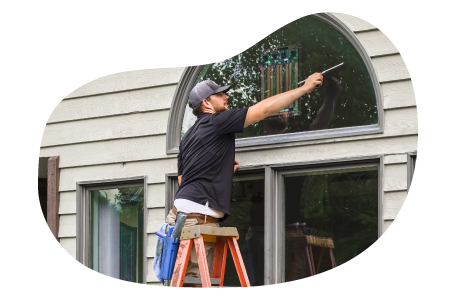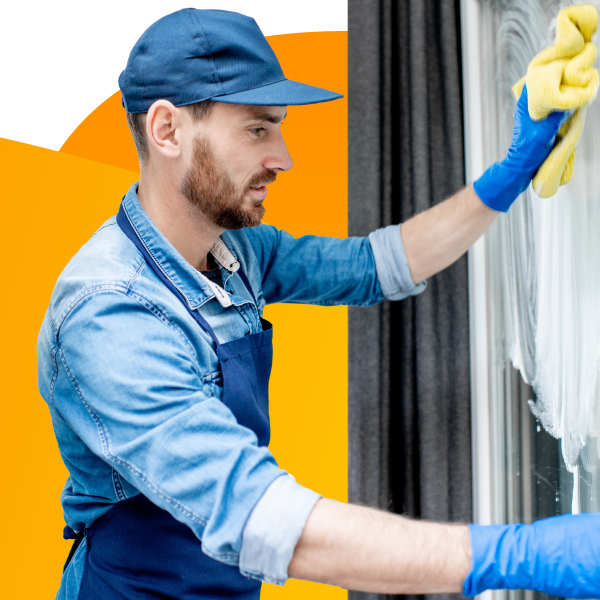

Why is business insurance a must for window cleaners?
As one of the more risky professions, should a window cleaning employee fall off a ladder or a client sue over accidental damage, your business could face severe financial burden. Window cleaning insurance can help cover medical care, lawsuits, and repairs. Some policies may even be required by law.

Get the right insurance
6 insurance policies every window cleaning business should consider
The following types of coverage protect against the most common risks window cleaning companies face.
General liability insurance
This policy protects window cleaners against costs related to third-party property damage and injuries, such as a client slipping on a wet floor. It's often required by commercial leases and contracts.
- Slip-and-fall injuries
- Accidental damage to a client's property
- Libel and other advertising injuries
Workers' comp insurance
Most states require window washing businesses with employees to carry workers' comp. Health insurance can deny claims for on-the-job injuries, which makes this policy valuable for sole proprietors too.
- Medical bills for injured workers
- Disability benefits
- Lawsuits from workplace accidents
Commercial auto insurance
Business vehicles owned by a window cleaner must have this coverage to comply with state laws. It helps pay for financial losses in an accident, including legal fees, medical costs, and property repairs.
- Auto accident injuries
- Auto accident property damage
- Theft of a cleaning van or other vehicle
Business owner's policy
Small window cleaning businesses and contractors are usually eligible for a business owner's policy (BOP), which bundles a general liability policy and commercial property insurance for less.
- Client bodily injuries
- Damaged customer property
- Stolen or damaged business property
Commercial umbrella insurance
Umbrella insurance boosts the protection of your general liability, commercial auto, or employer's liability insurance policy once the limit is reached on a claim.
- Personal injury lawsuits
- Auto accident lawsuits
- Workplace injury lawsuits
Fidelity bonds
Clients might ask your business to secure a fidelity bond, also called a janitorial bond, before they will allow your workers on their premises. It reimburses the client in the event of employee theft.
- Theft of cash or property
- Forgery
- Illegal funds transfer
Window cleaning insurance costs

From our customer data, here's a quick look at the average costs of common window cleaning insurance policies:
General liability: $60 per month
Business owner's policy: $89 per month
Workers' compensation: $136 per month
Factors that can influence window cleaner insurance costs include:
- Cleaning services offered
- Number of employees and additional insureds
- Types of insurance purchased
- Coverage limits and deductibles
- Claims history
Hear from business owners like you who purchased insurance coverage.
Why window cleaners choose TechInsurance
Get insured quickly with TechInsurance
Get insurance fast so you can get started working with clients. Fill out our easy online application, choose a policy, and pay online to start coverage today.

Common questions about insurance for window cleaning businesses
Review answers to frequently asked questions (FAQs) about window cleaning business insurance coverage and more.
Do window cleaners need a bond?
While most state laws don't require window cleaners, house cleaners, and other types of cleaning businesses to purchase fidelity bonds, also known as janitorial bonds, there are several reasons why a small business owner may purchase one:
- You need a bond to get licensed. In some states, a bond is part of the insurance requirements for getting a cleaning business license. Cities and counties sometimes have additional licensing laws and requirements, which could include a bond.
- You need a bond to sign a contract. Some clients will require your company to carry a bond before they will allow your employees on their premises. This is especially true for government entities and larger clients that might employ your business.
- You need a bond to attract new clients. Clients will typically choose to work with a bonded and insured company over one that does not carry this protection. A bond shows clients that your business is reliable and guarantees reimbursement in the event of theft.
Note that you may also see this kind of bond referred to as a surety bond.
Is my window cleaner business required to carry auto insurance?
Most states, except for New Hampshire and Virginia, require commercial auto insurance for business-owned vehicles. Your private auto insurance policy likely won’t cover you in the event of a work-related accident.
Commercial auto insurance covers you and your employees if you get into an accident while driving a company vehicle. It covers any property damage or personal injuries caused by your business vehicle, as well as your legal expenses. It will also pay for any medical expenses for yourself or an employee in a work vehicle accident.
If you're driving a personal, leased, or rented vehicle for work purposes, you'll need hired and non-owned auto (HNOA) insurance. This is because your personal or commercial auto insurance policies won’t cover any accidents that happen in personal, leased, or rented vehicles during work-related activities.
What other insurance coverage do window cleaning businesses need?
When building a comprehensive risk management plan, whether you're starting up a window cleaning business or operate an LLC, small business owners may need additional types of cleaning insurance, outside of general liability and workers' compensation insurance, to cover all risks and liabilities.
Some window washing insurance policies to consider are:
- Professional liability insurance: Also known as errors and omissions insurance (E&O), this policy protects your janitorial service business from client lawsuits over errors, mistakes, or negligence they claim negatively impacted them.
- Cyber insurance: Helps small business owners recover financially from cyberattacks and data breaches. It's recommended for any business that stores sensitive customer data, such as credit card numbers and email addresses.
- Inland marine insurance safeguards your business property (such as products, tools, and equipment) while it's in transit or stored at a job-site. Specifically, contractor's tools and equipment coverage is perfect for cleaning companies that use cleaning equipment valued at less than $10k and is less than five years old.


